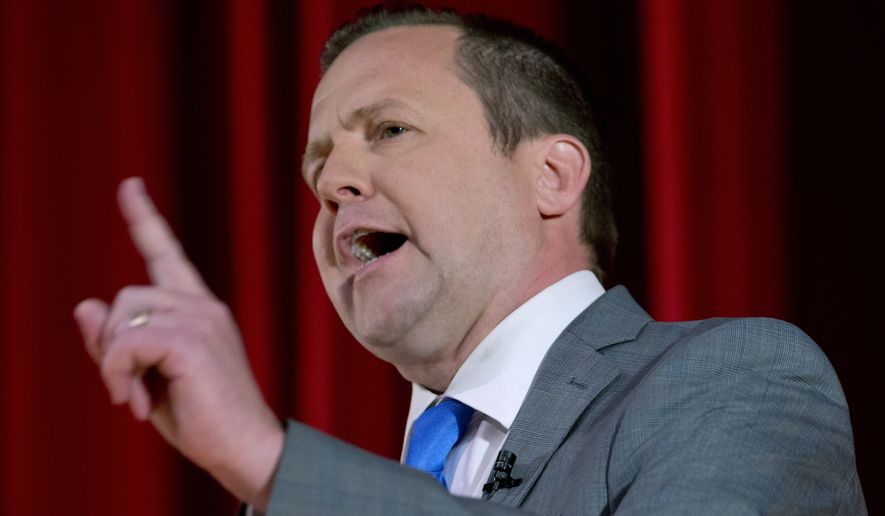President Trump says he is supporting Corey Stewart, the Republican nominee in Virginia’s Senate race, but other party leaders call the race a political time bomb and are reluctant to follow him.
Mr. Stewart emerged as the Republican nominee Tuesday after running a bruising Trump-style campaign. Primary voters rewarded his tough stance on illegal immigration, and liberal reporters declared him a racist.
In November, Mr. Stewart will face Sen. Tim Kaine, a Democrat who is seeking a second term. Mr. Trump called Mr. Kaine a “total stiff” and urged Virginia voters to give Mr. Stewart a chance.
“Don’t underestimate Corey, a major chance of winning!” the president tweeted.
Senate Republicans, though, doubted they would give Mr. Stewart much help in his quest to join them.
“Right now we’re focused on Florida, North Dakota, Missouri, Indiana — a big map, and I don’t see Virginia in it,” Sen. Cory Gardner, the Colorado Republican who heads the National Republican Senatorial Committee, told CNN.
Brian Schoeneman, a past Republican candidate in Virginia, said he left the Senate slot blank on his primary ballot Tuesday.
“I can’t vote for Stewart,” Mr. Schoeneman said. “His whole philosophy of governing is anathema to me. All the immigration-baiting … all the Confederate crap and the hanging-out with the Jason Kesslers of the world — that’s the exact antithesis of everything I’ve been trying to do with the party the last 20 years.”
Mr. Stewart rode an unapologetically pro-Trump message to victory with a blunt style, advocacy of Confederate monuments and heritage, and past associations with controversial figures.
He said he expects his embrace of Mr. Trump’s message will be rallying point for Virginia Republicans — as will his fierce opposition to Mr. Kaine.
“This is President Trump’s party,” Mr. Stewart said. “My mission is to get out Trump supporters and those who recognize the successes of the president.”
Mr. Stewart was a state chairman for Mr. Trump’s 2016 campaign until he got ousted for staging a protest at the national party’s headquarters, accusing it of undermining Mr. Trump.
This year, Mr. Stewart staged a protest for himself outside of NRSC headquarters, saying party leaders were conspiring against him. But he said Wednesday that he expects Republican senators will eventually follow Mr. Trump’s lead and embrace him.
“I’ve got his support, and that’s what counts,” he said. “And as the race becomes more competitive I expect the NRSC will come and support me financially as well.”
Mr. Stewart has fended off a barrage of questions in recent days over his past connections to people like Paul Nehlen, a Republican challenger to Speaker Paul D. Ryan in Wisconsin who has come under fire for anti-Semitic and racially tinged postings online, as well as Mr. Kessler, one of the organizers of the “Unite the Right” rally in August in Charlottesville.
Mr. Stewart called Mr. Nehlen “one of my personal heroes” in a video from January 2017 but distanced himself when the controversial comments surfaced this year.
He appeared with Mr. Kessler at an event in February 2017, several months before the push to remove a statue of Robert E. Lee from a public space in Charlottesville helped ignite a violent clash between white supremacists and counterprotesters that left one woman dead.
Mr. Stewart said at the time that the neo-Nazis involved in the march should be condemned but called out the left for not condemning violence perpetrated by movements such as antifa. He echoed language from Mr. Trump, who said there were “very fine people” on both sides of the protest.
Mr. Stewart says he has disavowed neo-Nazi figures but doesn’t regret opposing calls to take down historical monuments.
“We need to stop them from doing that, because not only is that a complete waste of taxpayer funding, but Virginians love their history. They don’t want to see it destroyed,” he said.
Mr. Kaine’s campaign said this week that Mr. Stewart “stokes white supremacy,” but the candidate stopped short of calling his rival a racist.
State Delegate Nick Freitas, who ran against Mr. Stewart in the primary, raised questions about those ties in the closing stretch of the campaign. He said he doesn’t think Mr. Stewart is a racist but has shown “horrible judgment.”
Rep. Barbara Comstock, who won her primary race in Virginia’s 10th Congressional District, said Wednesday that it was premature to say whether she would campaign with Mr. Stewart.
“We haven’t talked about that yet,” she told radio host John Fredericks. “I focus on my district, on the issues in my district, and this is a very independent electorate. And that’s what he will have to do too, and I imagine he will.”
Jack Morgan, a Stewart ally who worked for Ed Gillespie’s campaign in the governor’s race last year, predicted that the Republican base will eventually come around.
“Corey’s the nominee. He’s now the top-running Republican in the state. That’s what our party looks like right now,” said Mr. Morgan, who was the 9th Congressional District chairman for Mr. Trump’s 2016 campaign.
Republicans this decade have repeatedly nominated controversial candidates, in some instances costing them races they otherwise could have won, analysts say. Tea party candidates in 2010 and 2012 squandered winnable races, as did Roy Moore, the Republican nominee in a special election last year in Alabama.
Analysts say they have long expected Mr. Kaine to win re-election in a state trending increasingly Democratic.
Mr. Schoeneman said that may explain what he described as a relatively weak Republican field in the Senate primary.
“Corey didn’t win this because Republicans [in] Virginia suddenly decided that they want to run pro-Confederate, alt-right-loving guys for office,” Mr. Schoeneman said. “He’s been running for three years. You do that long enough, and you’re going to pull it off at least once.”
• David Sherfinski can be reached at dsherfinski@washingtontimes.com.




Please read our comment policy before commenting.